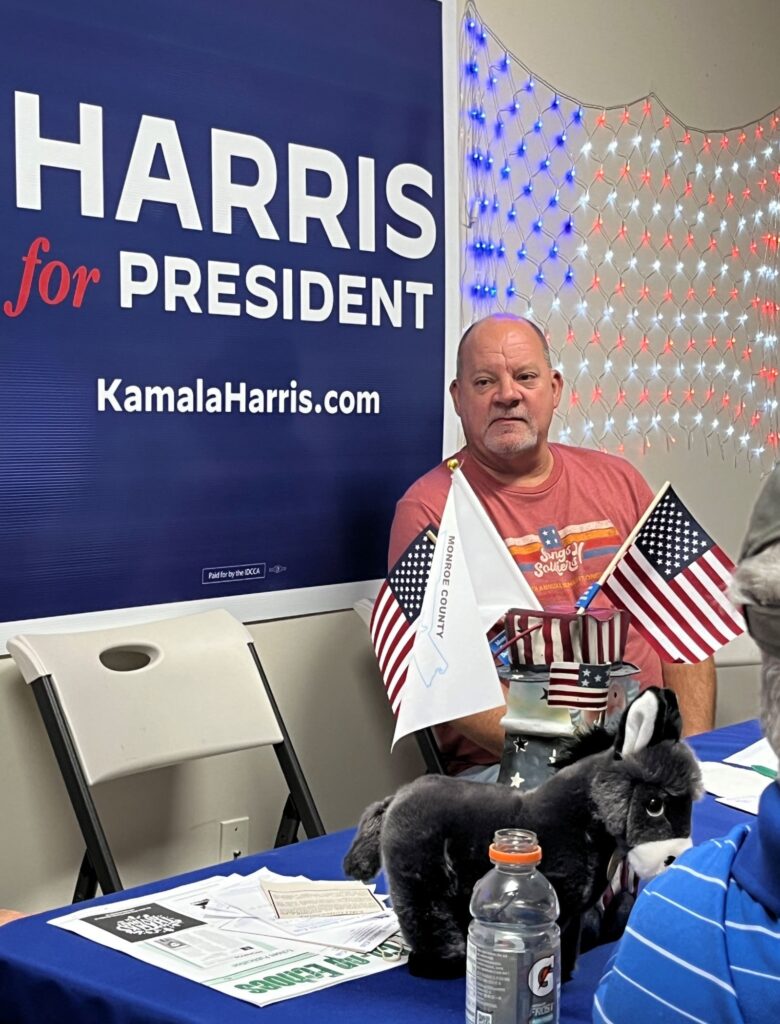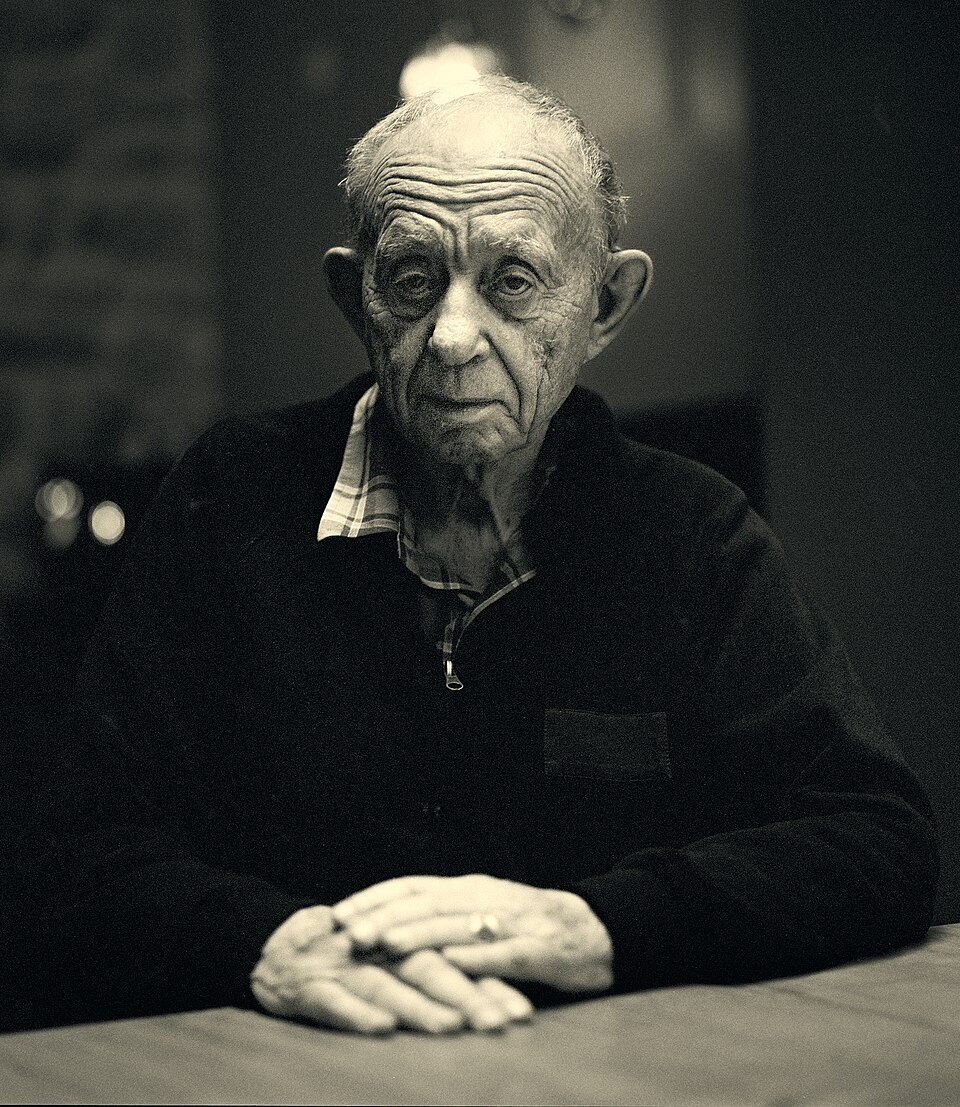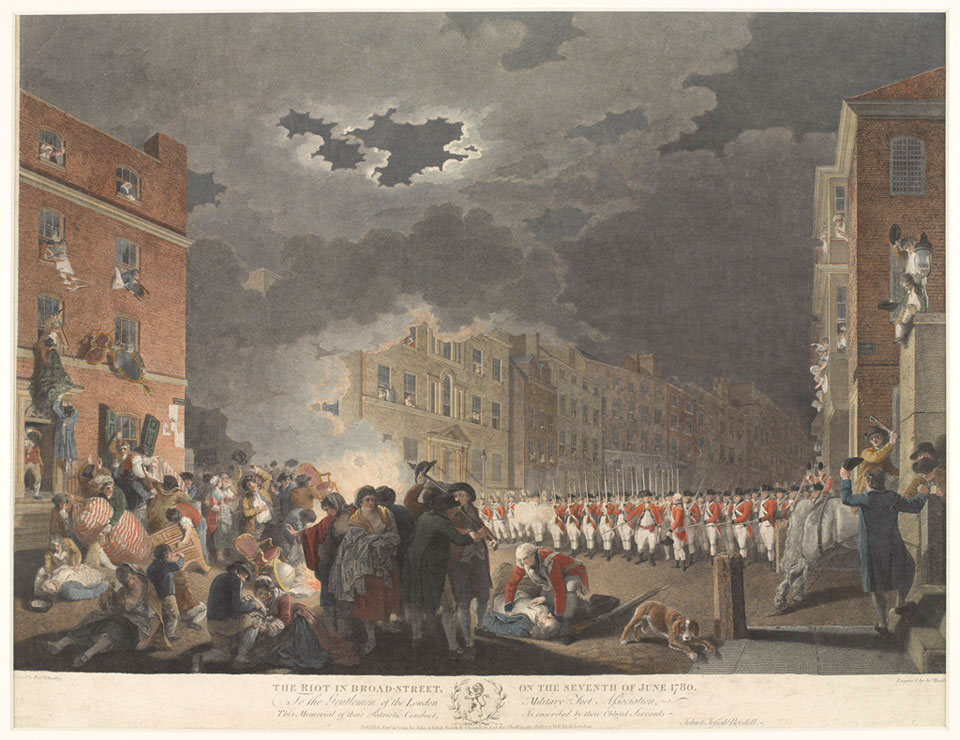Election Day in a Small Town in Southern Illinois
November 5, 2024

The tension in our usually placid household has been ratcheting up for days now. My stomach is tight; my husband’s blood sugar keeps spiking. We read each other the latest political outrage and talk nervously about the unrest we fully expect. What will happen in our sweet little town, a place where the majority casts a very different ballot than we do, and a giant Trump sign greets drivers as they curve round Rte. 156?
Andrew holes up after he votes, poised for any emergency. I spend the day going all over town, eavesdropping, taking the temperature. Up early, I go out into the dark, rain coming down in sheets. Braced for a gauntlet of political volunteers handing out propaganda outside the veterans’ hall, I find…none. Inside, a sweet older woman guides me through the process. Everyone is kind and courteous, the mood subdued, whether by rain or political exhaustion.
After voting, I head for a coffeehouse, stir cheese into my grits, and prepare to eavesdrop. On my phone are articles about “Election Day Jitters”—politics is turning into therapy. The New York Times announces that “A Caustic and Turbulent Race Is in Voters’ Hands.” Heather Cox Richardson notes that “foreign adversaries, especially Russia, are working ‘to undermine public confidence in the integrity of U.S. elections and stoke divisions among Americans.’” But here, people seem desperate to be peaceable.
The woman across from me has the same I Voted sticker on her sweatshirt. She is talking passionately with her friend about—I lean closer—granola. A couple at another table mention the election, but by the time I pick up my pen, the subject has changed to the next game for the Bulldogs, Waterloo’s high school football team.
Our everyday lives go on. The article below the Times headliner is “How to Get Rid of Plantar Warts.” I would rather read even that. “The older I get,” a woman tells me, “the more I try to care only about what’s happening in my little circle.” But what happens when our sphere of control shrinks smaller and smaller?
I hear a woman, politics unknown, regretting the Trump parade that blared through town this past weekend, wishing people would spend their time visiting nursing homes instead. We are all sick of the division. In our new timidity, we warn the likeminded in work or community settings, “Careful, she’s a Trumper,” or the opposite, and a wall (not the one he wanted) goes up. Or maybe it is the wall he, and all the other politicians, want. They have turned us into the Hatfields and McCoys, demanding a loyalty predicated on vilifying the other side.
Yet I catch myself—this choice is not the usual sort. Jon Meacham, a presidential historian who is not a Democrat, notes that Trump’s contempt for constitutional democracy, his “marshaling of fear, prejudice, resentment, xenophobia, and extremism” make him unprecedented. It is not a simple difference of opinion for a former president to wish he had held the Oval Office by force and ally himself with worshipful insurrectionists. It is not cute when the Proud Boys are watching for a black and gold necktie as a signal to initiate violence.
Here I go getting worked up again, frustrated that the nice people drinking lattes at the next table do not see this. Are they, for me, “the enemy within”? Quietly, I ask the barista if people have been talking politics lately. Sometimes, she says. “Mostly about Trump. Mostly about economics, how expensive everything is.” We talk longer, and it emerges that she is not a Trump supporter, though her parents are, “and we manage to talk without vitriol.” She did not want to vote at all, because she felt Harris was complicit in genocide. She cannot believe these two candidates are the best we can do. “It feels like the whole thing is rigged. It’s rigged to make us hate each other.”
We respond to the polarization like rabid sports fans, waving signs and screaming for our own team—thus deepening the divide and allowing whoever benefits to tear the country apart for their own ends. Some mainstream media outlets bow to the dictates of their corporate owners. (Hear that grinding whirring spinning sound? It is coming from Joseph Pulitzer’s grave.) Other outlets, confronted with lies and nonsense and criticized for bending too far backwards, have turned unabashedly partisan. Which I get—it feels like so much is at stake, that is the only moral course. But it leaves everybody in the wide middle unsure where to turn, what to believe.
At the library, a woman I adore for her wit and sharp intelligence—and disagree with cheerfully—brings up this media polarization too. We end up exchanging the names of newsletters and podcasts we have discovered (Tangle, Dispatches, Unherd) that try to steer an unbiased course. “Both the media and the politicians benefit from keeping us divided,” she says. “They push us to the extremes, because that is where the clicks and the money are.”
At the pharmacy, my favorite staffer is wearing a shirt that says HAVE FAITH, and she tells me that she heard of someone in another state voting for Trump and the screen flipping and showing Harris instead. “She tried three times and it kept happening,” she says, worried sick. She says whatever happens, it’s in God’s hands. Then she says that if Trump doesn’t win, “we’ll just have to work a little harder.”
At the charity thrift shop, the cashier says she was so worried last night that every time she woke up, she prayed. I decide that she, too, must support Trump. We agree that we cannot believe the country has come to this without either of us knowing what the other means by “this.” As I leave, I ask what outcome she predicts. She smiles. “I think we will go forward, not back. You can figure out from that.”
We both relax; we know the code. My assumption was flat-out wrong. It is wrong again at my next stop, when someone I know to be far more conservative than I surprises me by saying, “If Kamala wins we’re screwed, and if Trump wins, we’re fucked.” We find common ground fast: the left has turned intolerant and the right has lost its mind; the country needs a little less self-centered isolationism, a lot more candid and calm discussion.
I go home. There is no violence in the streets, I assure my pessimistic historian husband, who has been inhaling ominous news. There will be, he assures me. No doubt we are both right; this is a land of conspiracy theories that often come true.
In the evening, I drop in at the local Democratic headquarters. This is not the balanced reporting I just advocated. This is all I can stomach. They offer me food and drink—beer, water, soda, whiskey. “Whiskey,” I say, “straight up.” Slowly, we watch the map turn red. I babble about closing the divide, yet I live in a country with a majority of residents whose values I cannot even fathom.
One woman says her granddaughter’s boyfriend is from Pakistan, getting a doctorate in engineering, and this is his first U.S. election so he is glued to the TV.
What will he think of us, I wonder.
A small and convivial group, we Democrats huddle in this rented space in a strip mall as reports come in from local elections, all of them Republican landslides. “For years and years, there was a balance in this county,” remarks Sandra Reed, who worked in the zoning office. “The Democrats held the circuit clerk’s office, and the Republicans held the clerk’s office, and we never ran anybody against each other. Then all of a sudden that tilted. During Trump’s first run, we lost the Democratic office, and all bets were off. Everything changed. And now there is nobody in there to watch over the other person, no checks and balances, no taxpayers’ group to oversee spending.”
“People used to be able to talk,” someone says. “Now, when we go to parades, we are sneered at.” Someone else chuckles: “We’re lucky things aren’t thrown at us.”
I drive home thinking about how many people, on both sides, want civility back. Then I try to figure out how so many can think a man like Donald Trump will restore it.
Read more by Jeannette Cooperman here.




